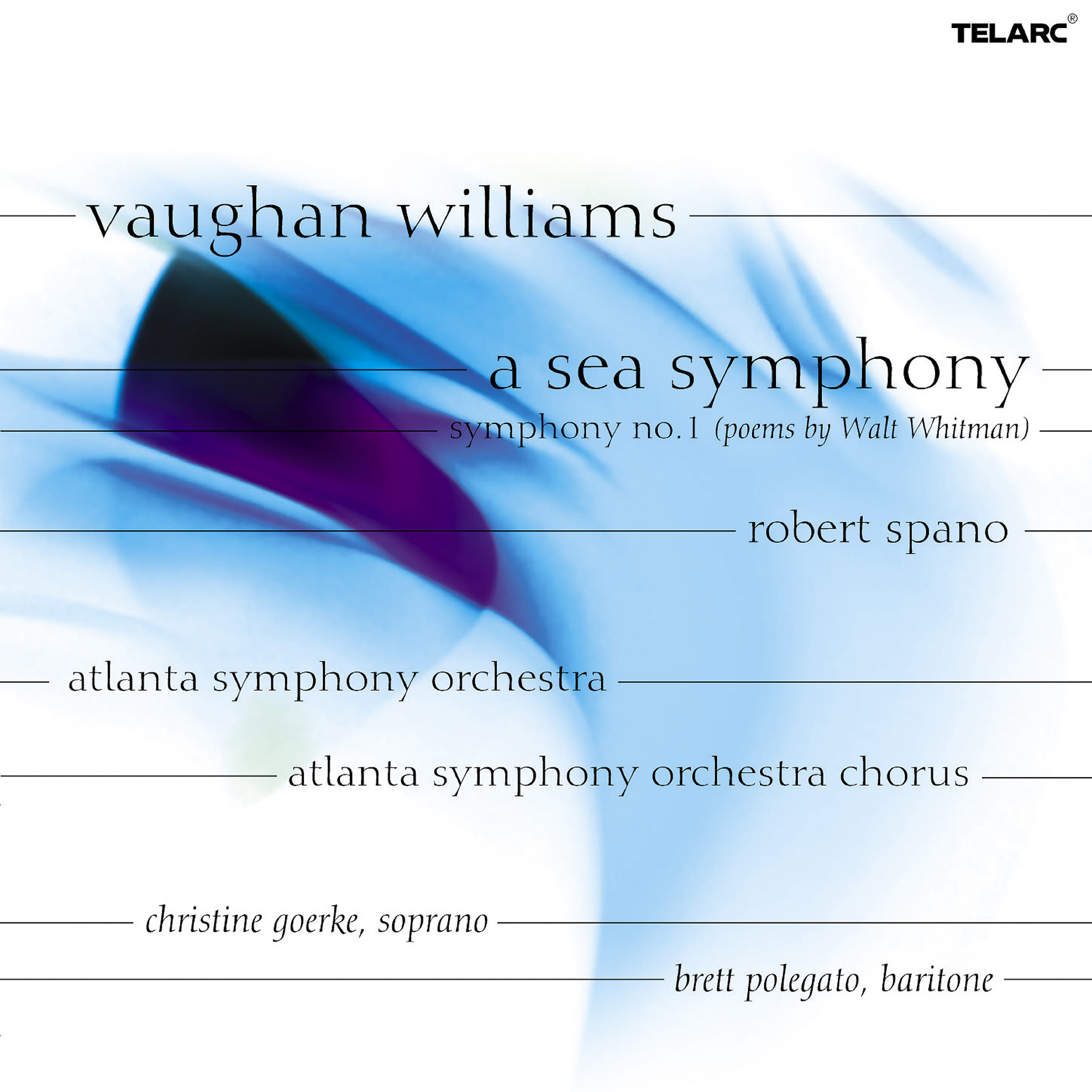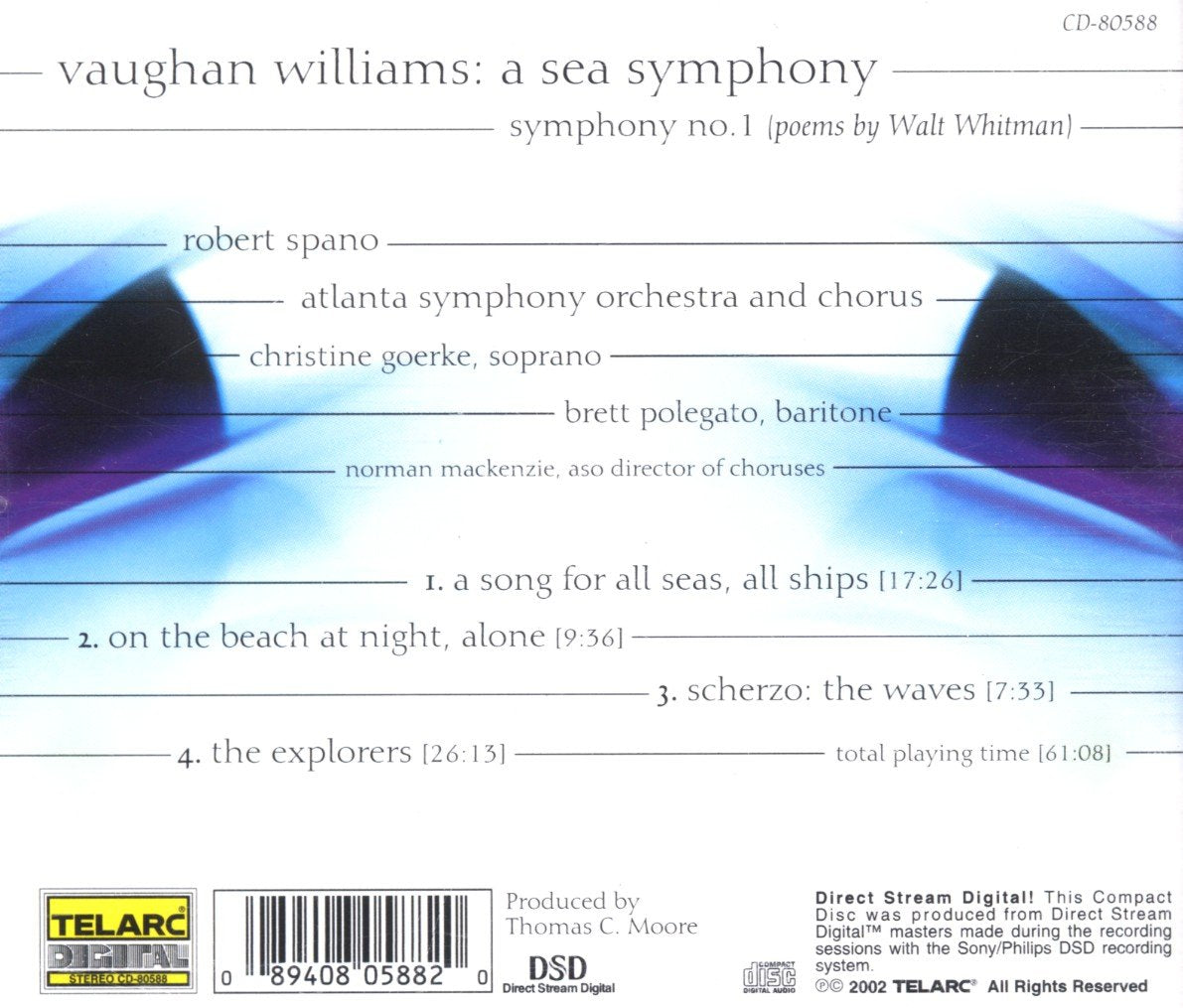Waves Lapping Swiftly
When this recording first appeared...
... most reviews pointed to Robert Spano's unusually fast speeds. Of course, the British Isles responded with the 'hasty Yanks' bit, but this performance was a breath of fresh air.
Of course since, more recordings of Symphony no. 1 have come forward imbuing a similar spirited approach, including from across the channel. I don't know if I fully enjoy the difference opposite the old-school grandiosity, but there are many ways for music to sound, and not all of them need to compete for correctness.
Plus, Walt Whitman was a US wordsmith, so sharing the composer's wonderful A Sea Symphony is more of a global opportunity than a culture clash, I think.
A review from 2016
Vaughan Williams’ Symphony No. 1 is a behemoth in every way: a large choral focus, heavy use of soloists, a large, romantic setting of the orchestra, and sprawling movements with grandiose themes. I have been familiar with many English interpretations of this work, so I was excited to hear what the North Americans had to say about it. Suffice it to say, the most evident aspect of Robert Spano’s interpretation is speed, especially in the first and third movements; and while I don’t feel that any inner details are lost, nor did I get a feeling that any sacrifices to the mood are lost, this performance can be a bit jarring for anyone who has lived with another recording of A Sea Symphony for any length of time.
The baritone soloist, Canadian Brett Polegato gets the brunt of the work as soloist and his voice is solid across his range; steady, secure, and powerful, he probably ranks among my favorite baritones in this work. American soprano Christina Goerke, known for her work in Wagner, has a meaty voice, also quite powerful, but I think I prefer the brighter voice of Yvonne Kenny which cuts through the orchestra better and sings a bit flashier than Goerke. Both soloists are easily heard over the orchestra and chorus, but seem perfectly natural in the sound space. Atlanta’s orchestra has always been well represented by the Telarc label and this is no different; they are certainly a world-class ensemble and give a confident performance here. Henry Wood Hall is a drier-sounding recording venue than I am used to (because of the large performing forces, many ensembles choose churches to perform in), but no musical oomph is lost here by the instrumentalists.
The best aspect of this recording is the American chorus, one whose timber I greatly prefer over some London performances. Their diction is crisp where some recordings struggle with balance and clarity, and while I might have liked them miked even a tad bit closer, the chorus is confident, if not quite as grandiose as I would like. Since all of the vocal performers are North American, the singers obviously are singing the Whitman text in its native accent, but since Vaughan Williams was English and A Sea Symphony has been a performance standard-bearer for that country, it takes some getting used to a different performing culture; nothing bad, just another way for this recording to stand out. Spano’s direction is good, and since Vaughan Williams liked faster speeds that have since been slowed and over-romanticized over time, this version may be a more accurate vision of the composer. That being said, some of the majestic moments are cursorily missed and thrills are chosen over subtlety; the third movement choral scherzo benefits most from this, but the outer movements left me wanting in spots. Taking all of this in, I appreciate a different interpretation, and it will stay in my circle of Sea Symphony recordings.
My usual go-to recording is Bryden Thomson's on Chandos, whose soprano soloist I love and its music making pushes and pulls every last bit of drama out of the music; the LSO is superbly represented on this recording, but the London chorus has some unusual timbers in the soprano sections and the chorus is more of a wash of sound compared to this much newer recording, but it’s inherent grandiose drama regarding the measure of man's existence has spoken most to me over the years. Hickox and Previn also gave some good accounts with the same London performers, Naxos’ Paul Daniel has some of the crispest choral diction along with similar speed to Spano, and the legendary Boult has the experience of knowing and performing in front of the composer. Otherwise, Spano gives a good companion recording to these others with typical outstanding sonics from Telarc; I suggest hearing as many as you can!
Work
Symphony 1 'A Sea Symphony'
I. A Song for all Seas (17.26)
II. On the Beach at Night (9.36)
III. Scherzo (7.33)
IV. The Explorers (26.13)
Soloists
Christine Goerke, soprano
Brett Polegato, baritone
Performers
Atlanta Symphony Chorus
Atlanta Symphony Orchestra
Robert Spano, conductor
Label: Telarc
Year: 2002
Total Timing: 61.08
I love A Sea Symphony from Vaughan Williams. Its grand gestures and choral / vocal attributes are arresting.
And yet, the work may have gotten flabby over the years. Spano certainly tightens things up, but maybe too much?
It is not a recording I come back to often, though, for I have my own favorites of this work. Yet, I hold onto it all the same.


Comments
Post a Comment